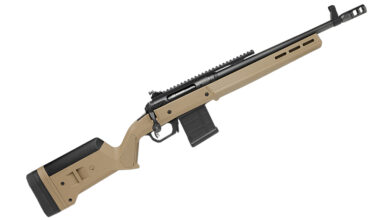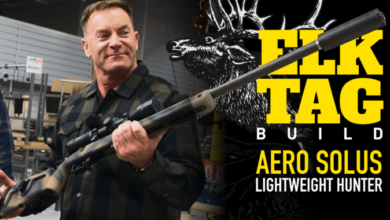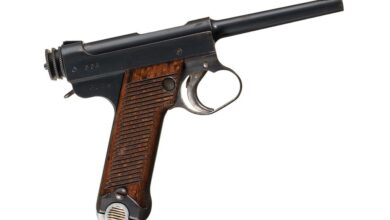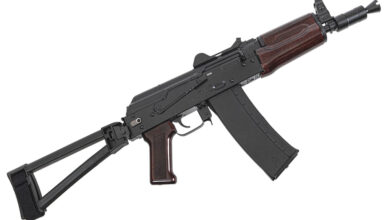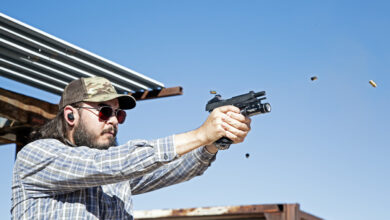9mm vs .380: Which is Better for Self-Defense?
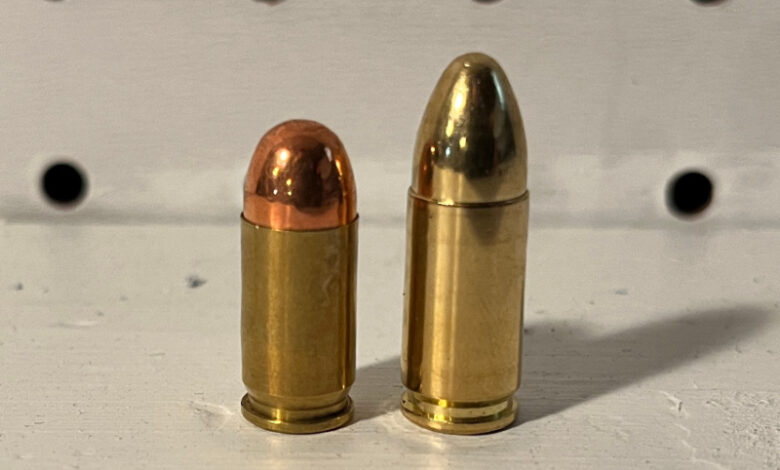
Choosing the right caliber for self-defense is a critical decision. It’s been a hot debate ever since John Browning popularized the .45 ACP in his famous 1911. The Germans then came along with the 9mm Luger, and the ammunition argument exploded (pun fully intended, as they all are). While we’re not here to settle the entire best-caliber debate in one article, let’s start with two very similar rounds that are often compared and considered for gun owners looking for a good self-defense round in their carry gun.
Two trendy options are the 9mm Luger (9x19mm NATO) mentioned above and the .380 ACP (Automatic Colt Pistol), also called the 9mm Short in Europe. Both have existed for over a century and offer distinct advantages and disadvantages. We will dive into the nitty-gritty of these calibers, comparing their ballistic performance, size, recoil, and suitability for self-defense.
Ballistic Breakdown: Size, Velocity, and Penetration
The key differences between 9mm and .380 lie in size and ballistic performance. Here’s a breakdown of the three crucial factors:
- Bullet Size: The 9mm fires a heavier bullet, typically weighing between 115 and 147 grains, compared to the .380’s lighter bullet of 90 to 100 grains. A heavier bullet translates to more sectional density, which is the bullet’s mass concentrated at its tip. This generally leads to better penetration and energy transfer to the target.
- Velocity: Modern 9mm ammunition boasts a higher muzzle velocity, ranging from 1,000 to 1,200 feet per second (fps), compared to the .380’s 900 to 1,050 fps. Higher velocity translates to flatter trajectories and more impact energy upon hitting the target.
- Penetration: Due to its heavier bullet and higher velocity, the 9mm generally penetrates deeper than the .380. This is crucial for ensuring the bullet reaches vital organs in a self-defense situation. However, overpenetration, where the bullet passes through the target and risks harming bystanders, is a concern with the 9mm, especially when using lighter bullet weights. Of course, you should always use defensive rounds rather than ball or practice ammunition in your carry and home defense guns to reduce the chances of overpenetration.
Real-World Performance: Ballistic gel tests provide a good starting point, but they only partially replicate real-world scenarios involving clothing and varying target anatomy. Shot placement remains paramount. A well-placed shot from either caliber can be effective for self-defense. However, the 9 mm’s superior energy transfer generally increases the likelihood of incapacitating an attacker.
Recoil Considerations: Recoil, the force exerted on the shooter when firing a gun, is another crucial factor. The 9mm’s heavier bullet and higher velocity generate more recoil than the .380. This difference can be especially noticeable in smaller, lightweight pistols. However, modern firearms often have features like recoil springs and grips designed to mitigate recoil. Additionally, proper shooting technique plays a significant role in managing recoil. Every gun has control issues if the shooter doesn’t know how to properly handle it. Poor grip equals bad shots and difficult recoil management.

Advantages and Disadvantages
9mm
Advantages:
- More powerful round with better stopping power.
- Deeper penetration for reaching vital organs.
- A wider variety of ammunition is available.
- Generally cheaper ammunition costs.
- More gunmakers offer 9mm options than .380 options.
Disadvantages:
- Higher recoil can be harder to manage, especially for new shooters.
- Overpenetration can be a concern in some situations.
- Larger and heavier pistols compared to some .380 options.

.380 ACP
Advantages:
- Lower recoil makes shooting easier for some, particularly those with less hand strength.
- Smaller and lighter pistols are available, ideal for concealed carry.
- Easier to manage for follow-up shots due to lower recoil.
Disadvantages:
- It is a less powerful round with lower stopping power than 9mm.
- Shallower penetration may not always reach vital organs.
- Limited ammunition options compared to 9mm.
- Generally, ammunition is more expensive.
- Magazine capacities tend to be lower in most pistols.
Choosing the Right Caliber for Self-Defense
The ideal caliber for self-defense depends on individual factors. Consider the following:
- Shooting Experience: If you’re a new shooter, the .380’s lower recoil might be more manageable, allowing you to focus on accurate shot placement. However, with practice, most people can handle the recoil of a 9mm effectively.
- Hand Strength: Shooters with limited hand strength may find the .380 easier to control.
- Firearm Size and Concealability: If you prioritize a small, lightweight pistol for concealed carry, the .380 offers more options. However, some modern 9mm pistols are remarkably compact.
- Ammunition Availability and Cost: 9mm ammunition is generally more readily available and cheaper than .380.
Safety Considerations: Regardless of caliber choice, safe handling, and responsible gun ownership are paramount. Take a firearms safety course, practice regularly at the range, and store your firearm securely.

Parting Shot
Both the 9mm and .380 can work as self-defense rounds. Both have sufficient velocity and accuracy to do the job. However, after all the considerations above, I’d stake my life on the 9mm if I had to choose. We’ve all heard it: A fair fight is a fight you intend to lose. I don’t intend to lose a fight for my life or the lives of those I love. My EDC is a 9mm. Have I carried a .380 before? Yes, but it was not my first choice. My advice when choosing a self-defense round is to pick the 9mm.
The post 9mm vs .380: Which is Better for Self-Defense? appeared first on The Mag Life.
Read the full article here

